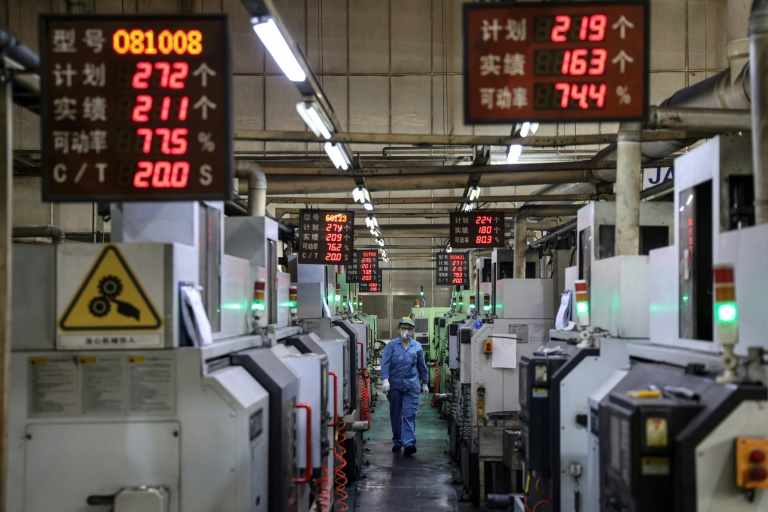
China’s economy is likely to have grown at its slowest pace this year, an AFP survey showed ahead of Friday’s data, as authorities struggle to revive consumption amid a chronic debt crisis in the property sector.
Officials in recent weeks unveiled a series of measures to revive the world’s number two economy and end years of depressed business activity with a view to achieving annual growth of five percent.
But after a blistering market rally fueled by hopes of a long-awaited ‘bazooka stimulus’, optimism has waned as authorities refrained from providing a specific amount for the bailout or further detailing commitments.
Officials will unveil third-quarter figures on Friday, with analysts polled by AFP predicting the economy will have grown by 4.5 percent – after growing 4.7 percent in the previous three months and 5.3 percent in January-March .
“The Chinese economy took a shot in the arm in September,” said Harry Murphy Cruise, economist at Moody’s Analytics, referring to the stimulus measures but adding that investors are “disappointed” by the lack of further announcements.
Beijing unveiled a series of measures in September to pump cash into the economy, including a series of interest rate cuts and relaxed restrictions on home buying.
But that support “will not be enough” to correct problems in the real estate market – once a key driving force in China’s economy, Murphy Cruise warned.
Analysts polled by AFP predict overall growth of 4.9 percent in 2024 – even worse than last year, which was the weakest in decades, excluding Covid.
Beijing has said it is “confident” it will achieve its target this year and revive the economy, but analysts say officials must go further and inject new money before the end of the year.
The need for aid has been highlighted by a prolonged series of data releases pointing to sluggish consumer activity, tepid inflation, minimal import growth and rising youth unemployment.
– ‘Promise fatigue’ –
Finance Minister Lan Fo’an said on Saturday that Beijing would issue special bonds to boost spending, but did not provide specific figures.
One analyst said there is now “promise fatigue” when it comes to tackling China’s economic problems.
“We have been disappointed in the past,” said Francois Chimits, senior economist at the Mercator Institute for China Studies.
“What we’re missing is a budgetary, possibly public financing effort.”
Analysts warn that without major reforms to the economy that address deep-rooted issues such as income inequality and social security, economic uncertainty will continue to fuel a vicious cycle that has kept consumption stubbornly low.
That comes amid broader concerns about job security, income stability and real estate prices, according to Benson Wu, China and Korea economist at Bank of America Global Research.
The lack of incentives to encourage spending is a “key challenge” to China’s economic recovery, Wu said.
Youth unemployment was 18.8 percent in August, the highest in 2024.
“Consumer confidence has declined, investors have become cautious and policy implementation has seen a decline in effectiveness,” Wu said.
Stimulating demand, especially for housing, is also crucial for a sustainable recovery.
A number of major cities have eased restrictions on home buying – most recently in Chengdu, the capital of southwestern Sichuan province, and the port city of Tianjin.
“The economy is still under the rubble of the housing crisis,” Gene Ma, head of China Research at the Institute of International Finance, told AFP.
While Ma said the most intense phase of the housing crisis is “probably over,” Beijing’s policies have focused too much on tackling supply rather than demand.
But analysts remain skeptical that there will be a major policy shift this year.
“Officials have pledged to halt the real estate market’s slide, addressing what has been a major drag on sentiment for more than four years,” said Murphy Cruise of Moody’s Analytics.
“We’ll believe it when we see it.”
mya/oho/dan







